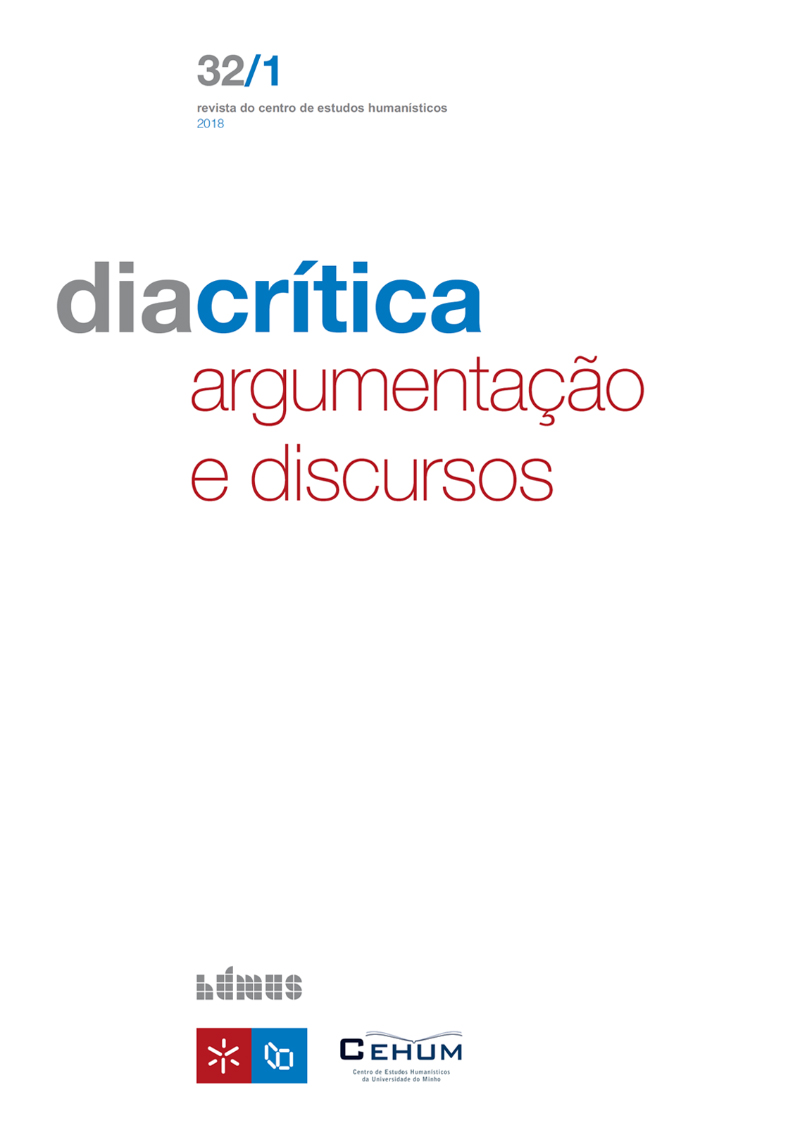Legal argumentation and rhetorical strategies: a pluridisciplinar analysis of a judicial decision
DOI:
https://doi.org/10.21814/diacritica.5021Keywords:
legal argumentation, rhetoric, point of view (PDV), ethos, pathosAbstract
This article is focused on theoretical perspectives that highlight the influence of social and historical contexts for the analysis of texts (Bronckart 1999; Adam 2017; Charaudeau 2017) and on approaches that emphasize the importance of rhetorical aspects to study legal texts (Pinto 2010; Damele 2011). Its goal is to analyse how argumentation and some rhetorical strategies are depicted in some legal text genres. The linguistic elements and the formal and normative aspects chosen by the professionals will portray, on the one hand, a more ‘rational’ argumentation related to the logos; and, on the other hand, more rhetorical, linked to ethos and pathos. With these strategies, the judge may attain his goal: to persuade the community that the thesis he supports is adequate to ‘solve the case’. In order to prove this hypothesis, we selected a conviction from the Court of First Instance in Rio Grande do Norte, Brazil. Preliminary results indicate that the argumentation present in legal documents may show some rhetorical strategies, and that these vary according to contextual constraints that may influence the textual and the rhetorical construction.
References
Adam, J.-M. (2017). Les Textes: types et prototypes. Paris: Armand Colin.
Bronckart, J.-P. (1999). Atividade de linguagem, textos e discursos. Por um interacioniso-sociodiscursivo. São Paulo: EDUC.
Charaudeau, P. (2017). Le débat public. Entre controverse et polémique. Enjeu de vérité, enjeu de pouvoir. Limoges: Lambert-Lucas.
Chiassoni, P. (2004). Codici interpretativi. Progetto di voce per un Vademecum giuri-dico. In P. Comanducci & R. Guastini (Orgs), Analisi e diritto 2002-2003. Ricerche di giurisprudenza analitica (pp. 55-124). Torino: Giappichelli.
Damele, G. (2013).Rhetoric and Persuasive Strategies in High Courts’ Decisions. Some remarks on the recent decisions of the Portuguese Tribunal Constitucional and the Italian Corte Costituzionale on same-sex marriage. Disponível em http://ssm.com/abstract=2118002. Acesso em: 29 de novembro de 2017.
Duarte, I. M. (2001). Do saber ao ensinar: em torno dos verbos introdutores de discurso relatado. In F. I. Fonseca, I. Duarte & O. Figueiredo (Orgs), A linguística na formação do professor de português
(pp. 125-134). Porto: CLUP.
Ferreira, I. R. C. (2016). A (não) assunção da responsabilidade enunciativa em narrativas que orientam as sentenças condenatórias de crimes contra a mulher. Dissertação de Mestrado apresentada ao Programa de Pós-graduação em Estudos da Linguagem para obtenção do grau de mestre em Estudos da Linguagem, UFRN, Natal, Brasil.
Kerbrat-Orecchioni, C. (2006). L ́énonciation: de la subjectivité dans le langage (4.ed.). Paris: Armand Colin.
Micheli, R., Hekmat, I., Rabatel, A. (2013). Les émotions: des modes de sémiotisation aux fonctions argumentatives. Semen, 35, 7-16. DOI: https://doi.org/10.4000/semen.9790
Perelman, C. & Olbrechts-Tyteca, L. (1988). Traité de l’Argumentation: la nouvelle rhétorique. Bruxelles: Université de Bruxelles.
Plantin, C. (2004). Ad Passiones. Affects Et Logique Dans L’argumentation. In M.A. Marques et al. (Orgs), Práticas de Investigação em Análise do Discurso – Actas do II Encontro Internacional de Análise Linguística do Discurso (pp. 163-179). Braga:
Universidade do Minho/Centro de Estudos Humanísticos.
Plantin, C. (2011). Les bonnes raisons des émotions: principes et méthode pour l’étude du discours émotionné. Berne: Peter Lang. DOI: https://doi.org/10.3726/978-3-0352-0070-6
Pinto, R. (2010). Como argumentar e persuadir? Prática Política, Jurídica, Jornalística. Lisboa: QuidJuris.
Pinto, R. (2013). Segurança e Linguística. In M. Pires & R. Calçada Pires (Orgs). Segurança e Confiança Legítima do Contribuinte (pp. 381-398). Lisboa: Universidade Lusíada de Lisboa.
Pinto, R. & Cortez, S. (2017). Do pathos retórico à empatia rabateliana: argumentação emocionada em textos/discursos emocionados. Revista de Letras, 36(2), 51-62. Disponível em www.periodicos.ufc.br/index.php/revletras. Consultado em 3 de abril de 2018.
Rabatel, A. (2014). Empathie, points de vue, méta-représentation et dimension cognitive du dialogisme. Études de linguistique appliquée, 1 (173), 27-45. DOI: https://doi.org/10.3917/ela.173.0027
Rabatel, A. (2016). Diversité des points de vue et mobilité emphatique. In M. Colas-Blaise, L. Perrin & G. M. Tore (Orgs), L’énonciation aujourd’hui: un concept clé des sciences du langage (pp. 135-150). Limoges: Lambert-Lucas.
Rabatel, A. (2017). Pour une lecture linguistique et critique des medias: empathie, éthique et point(s) de vue. Limoges: Lambert-Lucas.
Rodrigues, M. das G. S. (2016). Sentenças condenatórias: plano de texto e responsabilidade enunciativa. In R. Pinto, A. L. Cabral, Rodrigues & M. G. Soares (Orgs), Linguagem e direito: perspectivas teóricas e práticas
(pp. 129-144). São Paulo: Contexto. 110
Rodrigues, M. das G. S. (2017). Linguística textual e responsabilidade enunciativa. In R. Capistrano Jr., M. da P. Lins & V. Elias (Orgs), Linguística textual: diálogos interdisciplinares (pp. 299-316). São Paulo: Labrador.
Tomazi, M. M. & Cunha, G. X. (2016). O papel da polarização discursiva no processo de negociação de faces em processo judicial de violência conta a mulher. In R. Pinto, A. L. Cabral & M. G. S. Rodrigues (Orgs),
Linguagem e direito: perspectivas teóricas e práticas (pp. 145-164). São Paulo: Contexto.
Vanderveken, D. (1997). A lógica ilocucionária e a análise do discurso.
In D. Luzzati et al (dir.), Le dialogique (pp. 59-94) Berna: Peter Lang.
Vanderveken, D. & Melo, C. J. de S. (2017). Atos ilocucionários e discursos jurídicos na língua portuguesa. Trabalho apresentado no II Colloque International Communication et Discours e o Seminário do PROCAD 2013 USP / UFRN / UNISINOS. Natal : UFRN, junho de 2017.
Voese, I. (2006). Argumentação Jurídica. Curitiba: Juruá.
Downloads
Published
How to Cite
Issue
Section
License
Copyright (c) 2023 Rosalice Pinto, Maria das Graças Soares Rodrigues, Giovanni Damele

This work is licensed under a Creative Commons Attribution-NonCommercial 4.0 International License.










